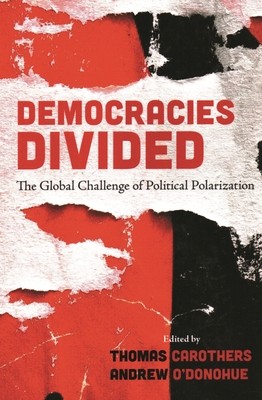
- We will send in 10–14 business days.
- Publisher: Brookings Institution Press
- ISBN-10: 0815737211
- ISBN-13: 9780815737216
- Format: 15 x 22.6 x 2.5 cm, softcover
- Language: English
- SAVE -10% with code: EXTRA
Democracies Divided (e-book) (used book) | bookbook.eu
Reviews
Description
"A must-read for anyone concerned about the fate of contemporary democracies."--Steven Levitsky, co-author of How Democracies Die
2020 CHOICE Outstanding Academic Title
Why divisions have deepened and what can be done to heal them
As one part of the global democratic recession, severe political polarization is increasingly afflicting old and new democracies alike, producing the erosion of democratic norms and rising societal anger. This volume is the first book-length comparative analysis of this troubling global phenomenon, offering in-depth case studies of countries as wide-ranging and important as Brazil, India, Kenya, Poland, Turkey, and the United States. The case study authors are a diverse group of country and regional experts, each with deep local knowledge and experience.
Democracies Divided identifies and examines the fissures that are dividing societies and the factors bringing polarization to a boil. In nearly every case under study, political entrepreneurs have exploited and exacerbated long-simmering divisions for their own purposes--in the process undermining the prospects for democratic consensus and productive governance.
But this book is not simply a diagnosis of what has gone wrong. Each case study discusses actions that concerned citizens and organizations are taking to counter polarizing forces, whether through reforms to political parties, institutions, or the media. The book's editors distill from the case studies a range of possible ways for restoring consensus and defeating polarization in the world's democracies.
Timely, rigorous, and accessible, this book is of compelling interest to civic activists, political actors, scholars, and ordinary citizens in societies beset by increasingly rancorous partisanship.
EXTRA 10 % discount with code: EXTRA
The promotion ends in 18d.15:07:23
The discount code is valid when purchasing from 10 €. Discounts do not stack.
- Publisher: Brookings Institution Press
- ISBN-10: 0815737211
- ISBN-13: 9780815737216
- Format: 15 x 22.6 x 2.5 cm, softcover
- Language: English English
"A must-read for anyone concerned about the fate of contemporary democracies."--Steven Levitsky, co-author of How Democracies Die
2020 CHOICE Outstanding Academic Title
Why divisions have deepened and what can be done to heal them
As one part of the global democratic recession, severe political polarization is increasingly afflicting old and new democracies alike, producing the erosion of democratic norms and rising societal anger. This volume is the first book-length comparative analysis of this troubling global phenomenon, offering in-depth case studies of countries as wide-ranging and important as Brazil, India, Kenya, Poland, Turkey, and the United States. The case study authors are a diverse group of country and regional experts, each with deep local knowledge and experience.
Democracies Divided identifies and examines the fissures that are dividing societies and the factors bringing polarization to a boil. In nearly every case under study, political entrepreneurs have exploited and exacerbated long-simmering divisions for their own purposes--in the process undermining the prospects for democratic consensus and productive governance.
But this book is not simply a diagnosis of what has gone wrong. Each case study discusses actions that concerned citizens and organizations are taking to counter polarizing forces, whether through reforms to political parties, institutions, or the media. The book's editors distill from the case studies a range of possible ways for restoring consensus and defeating polarization in the world's democracies.
Timely, rigorous, and accessible, this book is of compelling interest to civic activists, political actors, scholars, and ordinary citizens in societies beset by increasingly rancorous partisanship.


Reviews